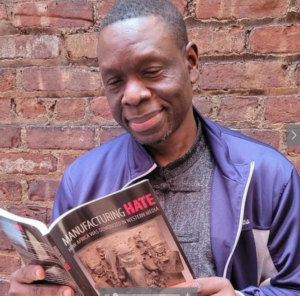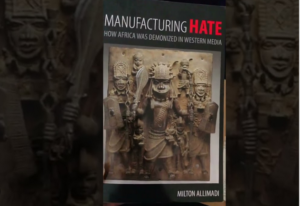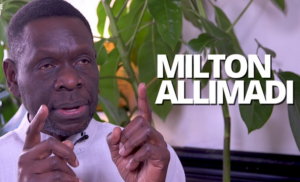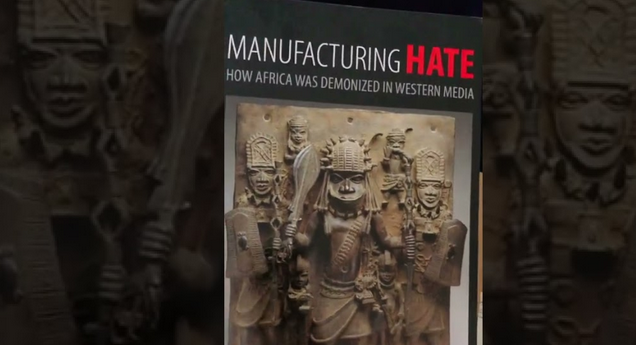By Milton G. Allimadi
Photos: Milton Allimadi\Book Cover\Wikimedia Commons
A few weeks ago I learned from one of my students at John Jay College that publisher Kendall Hunt Publishing Company is no longer offering the print version of my book “Manufacturing Hate — How Africa Was Demonized in Western Media” and only selling a digital version.

I’ve asked for the book’s copyright to revert to me. The publisher is demanding $3,000 from me to regain the copyright.
This is a book that needs to be widely read and I do want the copyright restored so I can get it to a wider audience — something the publisher doesn’t seem to be that interested in doing. The book’s reviews were excellent and people who’ve read it have sent me messages highly commending it.
When the book first came out in 2021, I received a couple of decent royalty checks with the first one being about $500, meaning the publisher was making money. Many years ago when I had a slightly different self-published version I’d sell-out every copy I carried with me to readings some times as many as 50 or 60. I have no doubt there’s a great market for and demand for the book.
Yet by 2022 people started contacting me to say they’d ordered the book via Amazon and had waited several months before getting it.
My book details demonization of Africa, Africans, and African descendants over the last three centuries in books and newspaper and magazine articles written by European writers — English and American. The book also uses archival documents — correspondences between reporters and editors — I discovered during my research that shows how some editors at The New York Times even fabricated incidents that never occurred in Africa to give stories a “barbaric” African flavor.
Demonization of Africa, Africans, and African descendants accompanied slavery and colonialism; today, demonization is effective in rationalizing neocolonial exploitation of Africa and her resources. Africans are now resisting the West’s continued demonization of Africa and continued control of the narrative. The story in West Africa isn’t just about fighting so-called “Jihadists,” as Emanuel Macron and France would like the world to believe.
It’s primarily about exploitation of Africa’s resources by France. That’s why the youth of Africa have been running to the streets to embrace coup leaders in Mali, Burkina Faso, and Niger. They believe that any change is better than the status quo.
Demonization of Africa, Africans, and African descendants helped spread the perception of Africans as the most inferior branch of the human family. This is ironic because science has confirmed that without a doubt all human beings originated in East and Central Africa about 200,000 years ago. The earliest most advanced civilization in the world was that of Kmet, a.k.a Ancient Egypt. Dynastic Kmet dates to 5,200 years ago — a pre-dynastic era dates even thousands of years before that.
This was a Black African civilization as the late Professor Cheikh Anta Diop proved by measuring the melanin content from tissue samples from mummies. Greek scholars acknowledged that the Ancient Egyptians were Black. Their civilization predates the Greek’s by centuries. So Western demonization in recent centuries has the narrative upside down.
Without Africa there would be no other civilizations. The first human beings were melanated, in order to survive the heat. It was after they migrated away from Africa, and over a period of tens of thousands of years of adaptation to climate and environment, that they took on new features and skin tones. The human family now includes “Africans,” “Europeans,” “Asians,” “Latinos,” — Had the original melanated people never left Africa all human beings today would be “Black.”
Yet centuries of demonization of Africa, Africans, and African descendants has promoted false notions of white supremacy while fostering equally false ones of Black inferiority. I’ve discussed this issue in several interviews including on “I Never Knew TV.”
When Kendall Hunt published my book in 2021 here’s what two reviewers said:
KIRKUS Reviews said in part, “A study of how Western reporters and editors have contributed to a distorted and derogatory representation of African people…In this disturbing and compelling account of Western media’s inglorious coverage of Africa, John Jay College adjunct professor and Black Star News publisher Allimadi reveals how ‘Demonization of Africans was the handmaiden of conquest and colonization’ and shows how reporters at distinguished publications manufactured ‘stereotypical racist representations’ of Africans that persist to this day.”
In another review, UNC-Chapel Hill Professor Georges Nzongola-Ntalaja, wrote in Review of African Political Economy, “Overall, this is an outstanding work of scholarship, and one that should be read by undergraduates and students enrolled in studies of journalism and communications generally, as well as by the general public. It is very timely, given the increasing migrations of peoples of colour to Europe and North America, which is being exploited by right-wing extremism.”
I’ve also written an article about the book called “Ooga-Booga Journalism — How Not To Write About Africa.”
What makes my book unique is that in addition to critiquing writings of European writers — going as far back as Herodotus in the 5th Century BC, then the writings of the so-called European “explorers” who went to “discover” Africa in the 18th century, and books and newspaper and magazine articles in the 19th, 20th and 21st centuries — I discovered internal correspondences in the New York Times’ archives that shows how this major international newspaper actively participated in demonization of Africa and Africans.

One of the most notorious racist New York Times correspondent was Homer Bigart, who’d already won the coveted Pulitzer Prize twice by the time the newspaper sent him to write about decolonization in Africa in late 1959.
When he got there here’s what he wrote to his boss, the New York Times foreign news editor Emanuel Freedman from Africa: “I’m afraid I cannot work up any enthusiasm for the emerging republics. The politicians are either crooks or mystics. Dr. Nkrumah is a Henry Wallace in burnt cork. I vastly prefer the primitive bush people. After all, cannibalism may be the logical antidote to this population explosion everyone talks about.”
Bigart’s contempt for Africa was conveyed in his articles. On January 31, 1960, The New York Times published an article by Bigart under the hateful headline “Barbarian Cult Feared in Nigeria.” Bigart wrote in his lead sentence that “A pocket of barbarism still exists in eastern Nigeria, despite some success by the regional government in extending a crust of civilization over the tribe of the pagan Izi.”
He added, “A momentary lapse into cannibalism marked the closing days of 1959, when two men killed in a tribal clash were partly consumed by enemies in the Cross River country below Obubra.” Yet, in the same article Bigart contradicts his own salacious claims of alleged cannibalism, when he continues: “Garroting was the society’s favored method of execution. None of the victims was eaten, at least not by society members. Less lurid but equally effective ways were found to dispose of them.” He added, “No trace has been found of these bodies. A few were buried in ant heaps. But most became human fertilizer for the yam crops.”
Editor Freedman delighted in Bigart’s racist caricaturization of Africans. “This is just a note to say hello and to tell you how much your peerless prose from the badlands is continuing to give us and your public,” Freedman wrote to Bigart, in a letter dated March 4, 1960. “By now you must be American journalism’s leading expert on sorcery, witchcraft, cannibalism and all the other exotic phenomena indigenous to darkest Africa. All this and nationalism too! Where else but in The New York Times can you get all this for a nickel?”
My research showed that some New York Times reporters objected to the racist depiction of Africans and fabrication of incidents that never occurred to give the stories about Africa a more “barbarian” flavor.
“The reference to ‘small pagan tribes dressed in leaves’ is slightly misleading and could, because of its startling quality, give the reader the impression that there are a lot of tribes running around half-naked,” Lloyd Garrison, a Times’ correspondent in Nigeria during the civil war, complained in a letter dated June 5, 1967 to the foreign news editor.
The article Garrison complained about had been published on May 31, 1967. Garrison’s original version had no such reference to Nigerian “small pagan tribes dressed in leaves”; that incident had been entirely fabricated and inserted into the article by editors in New York, perhaps to give the story a more “savage” flavor. Garrison also objected to the insertion of the words “tribes” and “tribesmen” by the editors in many of his past articles.
When I learned from one of my John Jay students — not from my publisher — that Kendall Hunt was no longer offering the print version of my book, on September 15, 2023, I asked for the copyright to revert to me. A company official named Faith Doyle wrote back to me via e-mail message on September 21, 2023 stating, “Hello, I wanted to let you know that I spoke with my managers about this to get approval and this was not approved. You can get your rights back by paying for them at a total of $3,000.”
I offered $500. On September 26 the company rejected the counter-offer and insisted on $3,000.
I’m determined to get back the copyright in order to stop this form of censorship.
I’ve launched a GoFundMecampaign to raise the funds to buy back the copyright from my publisher.
Only the truth can set us free.
Asanteni sana.
Milton Allimadi







